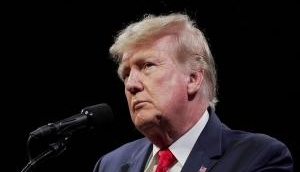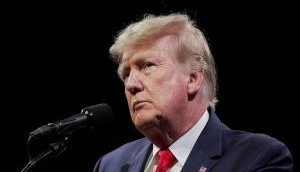Karzai backs Modi's Balochistan remarks, talks of how to battle extremism

As the Islamic State gains ground in Afghanistan, former Afghan President Hamid Karzai warned other countries in the region of the threat, while categorically stating that the organisation was being funded and operated from outside - an apparent reference to Pakistan.
"Afghanistan, Iran, India, Pakistan and China should be immensely concerned about Daesh in Afghanistan," Karzai said in New Delhi. "We should not be fooled into thinking that we can use them today," he said, citing the example of Pakistan, which follows the policy of using extremism as a tool of foreign policy, and is now itself at the receiving end of some of the terror groups.
Also read - Pakistan asks US to bomb Taliban hideouts in Afghanistan
The Balochistan issue
In his hour-long talk on 'Regional Power Play and the Rise of Radicalism in Afghanistan', organised by a Delhi-based think tank, Karzai also supported Indian Prime Minister Narendra Modi's Independence Day remarks on Pakistan's atrocities in Balochistan.
"I understand and appreciate his remarks," he said.
Karzai rubbished the assertion that India was engaged in a proxy war in Afghanistan with Pakistan. "India has trained thousand of Afghan youth. That is not proxy war. It is empowerment," he said, while adding that the people of Afghanistan were grateful to India.
Outside influences
Karzai went into the recent history of radicalism and extremism. He said Pakistan and the United States had used it as a tool to weaken the Soviet Union in the name of Afghan resistance. But this use did not end with the exit of the Soviet Union.
Karzai says Pakistan and the US, and their allies, continued with this policy, the former for its regional objectives of controlling Afghanistan through these forces, and the latter for its larger objectives in the region.
The former President pointed out that even while their acts in Afghanistan led to the weakening of the country, it had some 'unintended consequences' for Pakistan as well. That can well be seen as the rise of radicalism that manifested itself in several attacks like the one in Quetta, or the past incidents in Peshawar, Lahore, Karachi et al.
"Is it possible for me to promote the interest of Afghanistan at the cost of a Pakistani child? Never!" he said, pointing out how the use of extremism and religion has cost thousands of human lives.
Rethink, re-plan and re-implement
Karzai also spoke of how the policy of using religion for attaining strategic depth has failed, not just for Pakistan, but also for the US.
While Karzai was harsh on Pakistan, he was equally unsparing in his criticism of the US and its allies, and called for a three-pronged approach of "rethink, re-plan and re-implement".
"It has been 16 years since the US came to Afghanistan in the name of a war on terror. Have we seen less extremism as result of this war, or have we seen more extremism or terrorism?" he asked.
"If we have seen more extremism, more violence, more terrorism, then there must be a reason for it. If the intention is to succeed, then they will have to rethink, re-plan and re-implement," Karzai said.
"And this rethinking, re-planning and re-implementaion cannot be done in isolation by the US or us alone. It has to involve others countries," he advised, while pointing out that that there is an opportunity to involve other affected countries like India, Iran, and also China and Russia.
"I would never advocate the continued use of a heavy-handed military approach on this issue by the US. The bombing of Afghan villages will not get them what they want in Afghanistan," Karzai said, adding that there is no extremism in Afghanistan and that it is coming from another place. "We know the training grounds, the financial assistance, the motivational factors, all of them," he said, almost directly referring, to Pakistan. "Therefore, there has to be a rethink."
The root cause
Pointing out to the differences among the Pakistani political and security establishment, Karzai said that there are too many personalities and politicians in Pakistan, including Prime Minister Nawaz Sharif, who would agree to his suggestion that there is a need to abandon the use of religion and extremism as a tool for the promotion of objectives, as a tool of foreign policy.
"It just brought us destruction," he said.
The way ahead
The witty former President, who served from 2004 till 2014, pointed out that the Daesh in Afghanistan has its support and manpower coming from outside. Karzai said that he has been getting reports from locals and other sources, informing him how the group is being remote-controlled from beyond the border.
"Daesh is not a product of Afghan circumstances," he said. "It is a sinister tool... It is totally foreign to Afghanistan, it is being run by an agency from beyond the border," he said ,pointing out the difference between the Islamic State and the indigenous 'Taliban'.
"In Nangrahar, Daesh is a product of outside arrival. Taliban, by the way, are indigenous. Those Taliban who are Afghan, you know their tribes, their associations," he said, adding "that is why we must pursue all means to bring them back to the fold of our society and free them from the influence of the foreign agencies" - which was another reference to Pakistan, where most of the Taliban leadership has been provided sanctuaries by the Pakistani security establishment.
Meanwhile, calling the recent reports in the western press that have blamed him for the current chaos in Afghanistan and for the rift within the National Unity Government as "propaganda by the New York Times" (http://www.nytimes.com/2016/08/06/world/asia/afghanistan-hamid-karzai.html), Karzai said that he has no intentions of contesting the elections again. He said he has done enough and the new generation needs to take over.
"I like Afghanistan to be like flowing water, not stagnate," he said, adding how activism is in his nature and how he will continue to do it merely as a citizen.
More in Catch - PM Modi signs historic India-Iran-Afghanistan land transit trade pact
UN reports 11,002 civilian casualties in Afghanistan in 2015; Govt says numbers could be higher
First published: 21 August 2016, 3:16 IST





![BJP's Kapil Mishra recreates Shankar Mahadevan’s ‘Breathless’ song to highlight Delhi pollution [WATCH] BJP's Kapil Mishra recreates Shankar Mahadevan’s ‘Breathless’ song to highlight Delhi pollution [WATCH]](https://images.catchnews.com/upload/2022/11/03/kapil-mishra_240884_300x172.png)

![Anupam Kher shares pictures of his toned body on 67th birthday [MUST SEE] Anupam Kher shares pictures of his toned body on 67th birthday [MUST SEE]](https://images.catchnews.com/upload/2022/03/07/Anupam_kher_231145_300x172.jpg)






